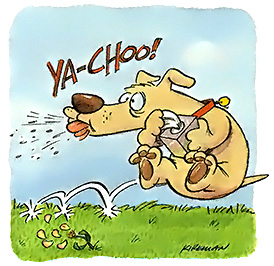There are many different causes for nasal discharge or sneezing in our furry friends and it seems that longer-nosed dogs are more likely to suffer than their shorter-nosed counterparts.
The more common ones would be foreign bodies, allergic reactions, kennel cough viruses, fungal infections and, sadly, nasal tumours. Occasionally, severe dental infections can cause a nasal discharge too. This discharge is usually of a cloudy appearance and may well come from just the one nostril.
If grass seeds become lodged in the nasal passages, they can cause infection and discharge so it’s a good idea to let your vet know if the sneezing or discharge starts when you have been exercising your dog in tall grasses. If you do believe your dog has something up his nose, please don’t try to remove it yourself as you will likely push it in and make it worse, injure the dog as you try to help or possibly even get yourself bitten.
Symptoms:
Discharge (varying from clear, cloudy or bloody depending on the cause)
One or both nostrils may show discharge
Sneezing
Snorting
Gagging
N.B. Remember that dogs do like to lick away any the evidence of nasal discharge, so you may need to keep a close eye to determine if there are actually any visible signs.
Once the vet has examined your dog (probably with the use of x-rays and a tiny camera with a light at the end called an endoscope) he may be able to diagnose the problem and remove it if it is something like a seed. If not, it might be necessary to take blood samples and biopsies to reveal the cause of the discharge.
Outlook
If the problem is diagnosed as kennel cough, a fungal infection or a foreign body in the nasal passages, the outlook for a cure is very good. However, if the tests reveal a nasal tumour or chornic inflammatory disorder, the outlook is sadly much poorer.
Therefore, if you notice your dog sneezing or having problems with any kind of nasal discharge, please seek professional veterinary attention for him. The sooner a foreign body is removed, an allergy is treated or a tumour is detected, the better the chances of a happy resolution.

